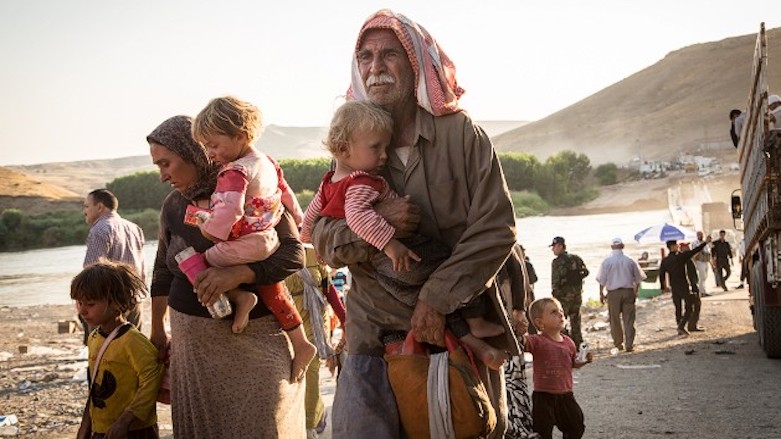Amb. Brownback: Yezidi areas lack security

WASHINGTON DC (Kurdistan 24) – Sam Brownback, US Ambassador-at Large for International Religious Freedom, recently visited northern Iraq and the Kurdistan Region as part of a delegation dispatched at the direction of Vice-President Mike Pence.
The aim of their visit was to examine how US assistance to ethnic and religious minorities persecuted by the Islamic State (IS) could be delivered more quickly and effectively.
This week, the State Department hosted the first-ever Ministerial conference on International Religious Freedom, and the fate of religious minorities in Iraq figured prominently.
Amb. Brownback addressed the press at the conclusion of the three-day event, and Kurdistan 24 asked him for his impression of the situation in northern Iraq, following his visit there.
Brownback’s response focused almost entirely on the suffering of the Yezidis (Ezidis) at the hands of IS. However, he raised another, very significant issue: the lack of security in the Ezidi areas, in northwestern Iraq, including along the border with Syria.
In addition to the “challenge” of rebuilding the Ezidi communities, “the second and the bigger one remains security,” Brownback said, stating that it is “still insufficient.”
“We met with the Prime Minister of Iraq” about that issue, he explained, and with “our military leadership as well,” underscoring his concern.
The emergence of this problem is a direct result of Iraq’s assault on Kurdish forces in Kirkuk and other disputed areas last October.
Until then, the region had been under Peshmerga control and was relatively calm. But since October, Iranian backed Shi’ite militias have taken over the area—which Tehran now uses as a transportation route to Syria, part of its “land bridge” to the Mediterranean.
On the positive side, Brownback said that he had been “impressed with the resilience of the Ezidis and the Christians in that area.”
“They are moving back,” he noted, but there “isn’t sufficient security in the region.”
The head of the US Agency for International Development (USAID), Mark Green, who accompanied Brownback on the trip and who also addressed the conference, met Ezidi leaders. But Green did not go to their area, because of the lack of security. Rather, they came to him, in safer territory.
Moreover, the Ezidi areas are now under a quasi-siege. Before Iraq’s attack last October, the Ezidi areas were supplied from the Kurdistan Region, using the road that runs from Dohuk to Shingal. Now, however, that road is blocked by Iraqi forces, and residents are obliged to travel a much longer route running though Mosul.
Brownback also explained that there are still “several thousand” Ezidis who “are unaccounted for and are probably being held in bondage somewhere else—probably Syria.”
“Heartbreaking” is how the Ambassador described the stories of Ezidi women, who “spoke about being sold three, seven, ten times.”
One woman told Brownback, “I’ll sell a kidney to get my children back, but I don’t know where they are now.” Another described having “a 15-year-old mentally challenged son of hers ripped out of her arms.”
Vice-President Mike Pence has taken a special interest in promoting religious freedom and protecting endangered religious minorities, including in the Middle East.
Last December Pence met with the Chaldean Archbishop of Erbil, Bashar Warda, when he visited Washington. And when Pence learned last month that Warda and other Christian leaders, seeking to rebuild their communities, had received no support from USAID, he issued an unusual public rebuke, prompting the trip of the US delegation to northern Iraq and the Kurdistan Region, where many Christians from the Nineveh Plains have taken refuge.
At the International Religious Freedom conference, Pence announced that the US would establish a Genocide and Recovery Response Program that would aim “to rapidly deliver aid to persecuted communities, beginning with Iraq.”
The State Department is responsible for “humanitarian demining”—neutralizing and removing IEDs, after the fighting ends, and civilians start returning home.
Secretary of State Mike Pompeo announced that the department would provide “an additional $17 million” of “demining efforts in the Nineveh region in Iraq,” which will be “on top of the $90 million we have provided countrywide” this year.
“The additional funding will help us make more progress in clearing mines from areas with a large population of religious minorities who were subject to [IS’] genocide,” he said.
The Ezidi areas are in desperate need of such assistance. Kurdistan 24’s correspondent in Shingal reports that the people are neglected by Baghdad. Only 20% of the population has returned home, because IEDs remain a serious danger, while basic services are sorely lacking.
Indeed, several thousand people are still camped, in miserable conditions, on Mount Shingal, to where they fled four years ago, as IS bore down on them.
Mount Shingal is the spot from where Saddam Hussein fired 39 missiles at Israel during the 1991 Gulf War. As that conflict ended, Saddam asked, “Who will fire the 40th missile?”
Paul Davis, a former Pentagon analyst, now a fellow at Soran University, advised Kurdistan 24 that if the US is not moved sufficiently by the plight of the Ezidis to fix this problem, the fact that Mount Shingal is now in the hands of Iran and its proxies should prompt more decisive action.
Next week, August 3, will mark the fourth anniversary of the Ezidi genocide at the hands of the IS terrorist group.
(Mahir Shingali and Baxtiyar Goran contributed to this report)
